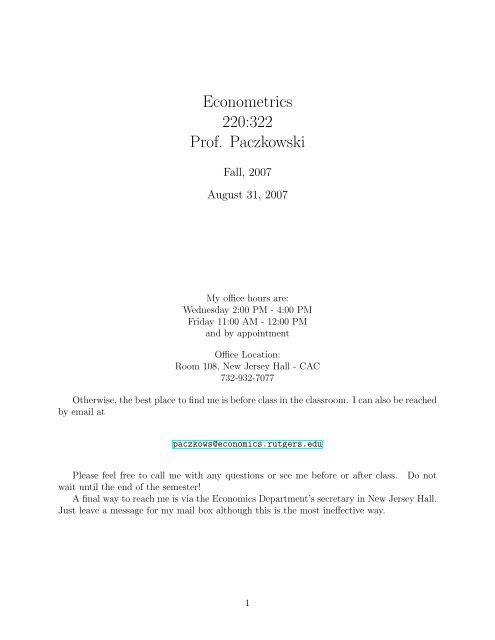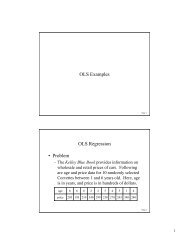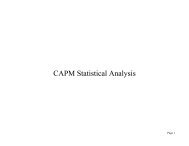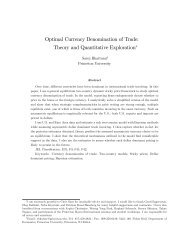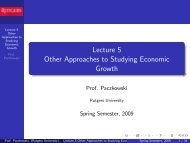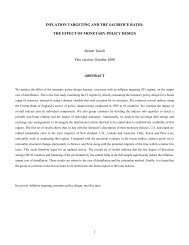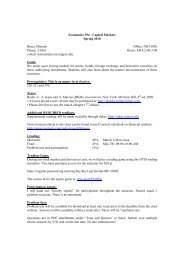Econometrics 220:322 Prof. Paczkowski - Department of Economics
Econometrics 220:322 Prof. Paczkowski - Department of Economics
Econometrics 220:322 Prof. Paczkowski - Department of Economics
You also want an ePaper? Increase the reach of your titles
YUMPU automatically turns print PDFs into web optimized ePapers that Google loves.
<strong>Econometrics</strong><br />
<strong>220</strong>:<strong>322</strong><br />
<strong>Pr<strong>of</strong></strong>. <strong>Paczkowski</strong><br />
Fall, 2007<br />
August 31, 2007<br />
My <strong>of</strong>fice hours are:<br />
Wednesday 2:00 PM - 4:00 PM<br />
Friday 11:00 AM - 12:00 PM<br />
and by appointment<br />
Office Location:<br />
Room 108, New Jersey Hall - CAC<br />
732-932-7077<br />
Otherwise, the best place to find me is before class in the classroom. I can also be reached<br />
by email at<br />
paczkows@economics.rutgers.edu<br />
Please feel free to call me with any questions or see me before or after class. Do not<br />
wait until the end <strong>of</strong> the semester!<br />
A final way to reach me is via the <strong>Economics</strong> <strong>Department</strong>’s secretary in New Jersey Hall.<br />
Just leave a message for my mail box although this is the most ineffective way.<br />
1
1 Course Objectives<br />
<strong>Econometrics</strong> is the application <strong>of</strong> a specific method in the general field <strong>of</strong> economic<br />
science in an effort to achieve numerical results and to verify economic<br />
theorems. It consists in the application <strong>of</strong> mathematical economic theory and<br />
statistical procedures to economic data in order to establish numerical results in<br />
the field <strong>of</strong> economics and to verify economic theorems.<br />
G. Tintner, <strong>Econometrics</strong>, 1952<br />
This quote by Tintner, one <strong>of</strong> the pioneers <strong>of</strong> econometrics, summarizes the thrust <strong>of</strong> this<br />
course: to use both mathematical and statistical tools to analyze data to verify economic<br />
theorems. Economic theories, like those for any science, <strong>of</strong>fer little value to the advancement<br />
<strong>of</strong> the science or help in policy formulation if they contradict reality. The theories must be<br />
tested with data. This course is concerned with testing theories.<br />
The general objectives for the course are:<br />
1. to provide you with a more detailed introduction to statistical concepts than normally<br />
acquired in a basic statistics course;<br />
2. to provide you with the basics <strong>of</strong> econometric analysis focusing on the least squares<br />
methodology for single explanatory and multiple explanatory variables;<br />
3. to provide you with an understanding <strong>of</strong> data analysis applicable to economic problems;<br />
4. to expose you to the use <strong>of</strong> a computer package for analyzing data;<br />
5. to allow you to apply the techniques learned in the course to lab assignments.<br />
Specific objectives are to instruct you in:<br />
1. data issues for economics;<br />
2. the principles <strong>of</strong> least squares analysis;<br />
3. the verification <strong>of</strong> assumptions behind least squares analysis;<br />
4. the correction <strong>of</strong> some major least squares assumptions violations.<br />
Emphasis is placed on a combination <strong>of</strong> the mathematical development <strong>of</strong> econometric<br />
tools and their application to data. The applications are in lab sessions in which you will<br />
be instructed in using an econometrics computer package and asked to solve problems using<br />
that package. The problems consist <strong>of</strong> a combination <strong>of</strong> exercises to<br />
1. analyze data both graphically and statistically;<br />
2. estimate equations and test assumptions <strong>of</strong> the equations;<br />
3. manipulate features <strong>of</strong> the computer package.<br />
2
2 Prerequisites<br />
The prerequisites are listed in the course description.<br />
3 Math/Statistics Requirement<br />
<strong>Econometrics</strong> is a subset <strong>of</strong> statistics which is a subset <strong>of</strong> mathematics. Consequently, there<br />
is no way this course can be taught without the use <strong>of</strong> math. The math, however, is at the<br />
algebra level with the use <strong>of</strong> some elementary calculus.<br />
Since econometrics is a subset <strong>of</strong> statistics, you should already understand the basics <strong>of</strong><br />
statistical methods and theory including:<br />
1. elementary probability theory;<br />
2. elementary distributions such as the normal and t distributions;<br />
3. hypothesis testing and confidence intervals.<br />
Ample review, however, is given so that you will not be disadvantaged if you do not have<br />
a good background in these topics. New topics usually not introduced in a one-semester<br />
statistics course are reviewed.<br />
4 Calculators<br />
Since numerical calculations will be done <strong>of</strong>ten in class, you will need a calculator with the<br />
usual functions. You can use a calculator for the exams, however, you will not get any credit<br />
(i.e., you will get a zero) for merely writing down an answer from the calculator. For any<br />
credit at all, you must show that you know how to do the problem, not that you know how<br />
to use a calculator. You will not be allowed to use a cellphone or pda that has a calculator.<br />
They do not have the functionality to do the required work.<br />
5 Textbook<br />
The textbook is:<br />
Using <strong>Econometrics</strong><br />
5 th Edition<br />
A. H. Studenmund (Pearson Addison-Wesley)<br />
There is no workbook.<br />
Please be aware that there are notation differences between my lectures and the book.<br />
You are expected to identify these and make the necessary translations. This is your responsibility.<br />
A tutorial with command instructions for using the s<strong>of</strong>tware package, EViews, are available<br />
online. See An Introduction to Statistical Computing on my web site:<br />
3
http://econweb.rutgers.edu/paczkows<br />
Handouts will be provided as necessary to supplement lectures but not to replace your<br />
responsibility to attend class and take notes.<br />
6 Textbook Reading Assignments<br />
Reading assignments will be announced in class. You are expected to read the assignments<br />
and be prepared for class discussions. Lectures cover material that are extra to the assignments<br />
and either supplement or reinforce the readings. You are responsible for both the<br />
readings and the lectures.<br />
7 Exams and Lab Sessions<br />
There will be three exams (two hourly exams and a final) and lab assignments.<br />
The final is already scheduled by the University. Please refer to the following table for<br />
your section:<br />
Section Date and Time<br />
07 December 17, 8 - 11 PM<br />
Above all, please check the Univeristy website for exam dates and times:<br />
http://scheduling.rutgers.edu/fallfinals.htm<br />
It is your responsibility to verify the date and time. The two hourly exams will be approximately<br />
the first week <strong>of</strong> October and the first week <strong>of</strong> November. These are typically<br />
announced one week before the exam.<br />
The three exams are comprehensive and will be focused on grand themes and issues.<br />
They are meant to synthesize the material. Each exam explicitly covers only the material<br />
in the reading assignments and covered in class since the last exam. In this sense, exams<br />
are not cumulative. They are cumulative, however, in that you are expected to know and<br />
understand previously covered material and be able to handle new material. The material<br />
builds. In addition, each exam will consist <strong>of</strong> multiple choice and true/false questions.<br />
There are no makeups for missed exams due to tardiness or being absent - no excuses.<br />
A make-up exam is allowed only after prior permission is granted to miss that exam (rarely<br />
given!!) or there is a note from the Dean’s Office and appropriate documentation (e.g.,<br />
medical, court order). It is your responsibility to notify the Dean’s Office <strong>of</strong> a medical or<br />
personal problem (e.g., death in the family) resulting in a missed exam. Excuses are not<br />
accepted; only a note from the Dean’s Office will be accepted - maybe! A make-up exam<br />
is not necessarily the same as the regular exam. Obviously, a make-up is not given for the<br />
final.<br />
4
There are approximately four lab sessions in which you will be asked to solve problems<br />
using an econometrics package. The lab sessions are designed to allow you to become familiar<br />
with an econometrics package while at the same time learn how to apply the techniques<br />
learned in the course to real data. You will be asked to enter data, estimate equations,<br />
graph data, and write a brief one paragraph interpretation <strong>of</strong> the results.<br />
8 Grades<br />
All assignments and exams and the labs have points. Grades are determined on a pointsearned<br />
basis with the following importance weights<br />
A straight curve is used:<br />
9 Appeals<br />
Exam 1 25%<br />
Exam 2 25%<br />
Final 25%<br />
Labs 25%<br />
90% to 100% A<br />
88% to less than 90% B+<br />
80% to less than 88% B<br />
78% to less than 80% C+<br />
70% to less than 78% C<br />
60% to less than 70% D<br />
Less than 60% F<br />
Students occasionally feel that a grade is too low. In such a case, an appeal consisting <strong>of</strong><br />
one (1) double spaced, typed page plus a copy <strong>of</strong> the exam or paper with my comments on<br />
it may be submitted at any time up to and including the last class, but not beyond.<br />
The appeal should contain an argument as to why a particular grade should be changed.<br />
Not all appeals are accepted. An appeal that says, for instance, ”But I studied hard” or ”I<br />
worked all semester and just got a C - I deserve better” or ”You graded me unfairly” are not<br />
acceptable.<br />
Appeals are reviewed only at the end <strong>of</strong> the semester and only when it is believed that<br />
a grade may be changed. Do not ask if I reviewed an appeal at any point in the semester<br />
- the answer is ”No” . Appeals are only reviewed at the end <strong>of</strong> the semester to determine<br />
borderline cases.<br />
10 Late Submissions<br />
Late papers will not be accepted; they receive an automatic zero. Papers placed in my<br />
mailbox, left on my desk, or shoved under my <strong>of</strong>fice door will not be accepted; they are<br />
automatic zeros. There are no exceptions unless you have a note from the Dean’s Office.<br />
5
11 Final Course Grades<br />
Final course grades will be available in the usual way.<br />
12 Attendance Policy<br />
Attendance is taken at the beginning <strong>of</strong> each class.<br />
13 Frequently Asked Questions<br />
See my web site<br />
http://econweb.rutgers.edu/paczkows<br />
These FAQs give answers to most class policy questions.<br />
6


